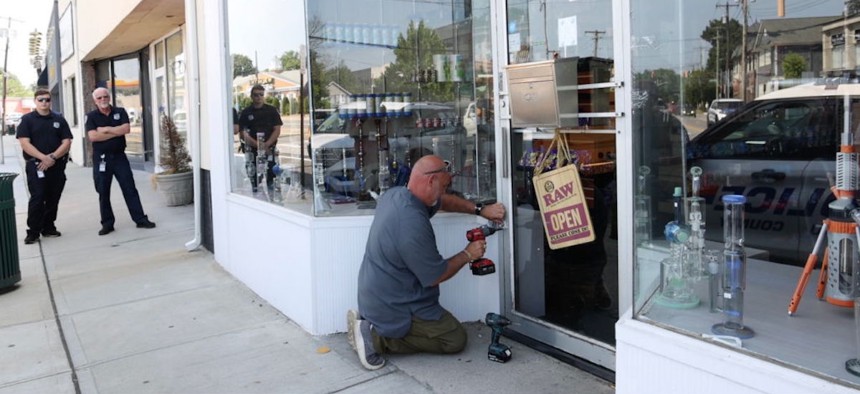What to expect in the first year of cannabis legalization

The Exotic Vape Shop is shuttered with a padlock by the Town of Oyster Bay for allegedly selling cannabis products on the premises without a license, on July 11, 2023, in Syosset, New York. Photo by Howard Schnapp/Newsday RM via Getty Images
Connecting state and local government leaders
Twenty-three states have legalized recreational marijuana, but governments are still learning how to iron out the regulatory, business and safety considerations of pot legalization.
This story is republished from the Minnesota Reformer. Read the original article.
Marijuana has been legal in Minnesota for one week, and so far the sky hasn’t fallen.
As people all over the state celebrate the ability to use their recreational drug of choice without fear of prosecution, officials are beginning the hard work of setting up the regulatory infrastructure to oversee a new industry.
Until the first retail shops open, marijuana exists in a strange gray area where it’s legal to possess and use, but not to buy or sell. That means things are going to be a little weird for a while—here are a few trends to watch out for in the coming year.
The Sooner Retail Licenses Are Issued, the Better
Right now it’s legal to use marijuana in Minnesota, but there’s no place to legally buy it, with the exception of a couple of dispensaries on reservations that aren’t subject to state licensing rules. That legal limbo means that black market sellers will continue to operate, especially with law enforcement increasingly prioritizing enforcement of other drugs.
This isn’t unusual: Because of the time it takes to set up brand-new regulatory structures, most other states allowed possession and use well before retail sales. In Colorado, for instance, there was a period of a little over a year between when voters approved legalization and when the first shops opened.
The state of New York, on the other hand, provides a cautionary tale of what happens when regulators drag their feet. More than two years after legalization was signed into law, there are just a handful of state-licensed retailers open. To meet demand, people have opened up unlicensed storefronts in places like New York City, creating what is effectively an open-air black market.
Legalization’s Drawbacks Will Make Headlines, but the Benefits Likely Won’t
Things like pot contributing car crashes and sick kids going to the hospital tend to make headlines, and they’ll continue to do so in the era of legal weed. Make no mistake: There are any number of drawbacks to legalization, including increased rates of heavy use (leading to abuse, dependence and other mental health problems); inadvertent pediatric exposures; and impaired driving. Conflicts between state and federal law, including the murky legal status of non-citizens who use cannabis, are another serious issue.
Opponents are likely to seize on these issues as evidence that legalization is a failed policy that should be reversed. But there are widespread benefits to ending prohibition, too. They include the economic impact of a brand-new industry, the ability to reallocate scarce law enforcement resources to more serious offenses, and the potential elimination of a major sector of the illicit drug trade.
But legalization’s most important benefit may be the hardest to quantify: The expansion of individual rights that allows Minnesotans to freely consume a recreational substance without fear of prosecution. While you can’t assign a dollar value to this, individual liberty is one of the country’s founding principles.
Cities Will Institute Temporary Bans on Marijuana Businesses While They Can
The legislation allows municipalities to issue a temporary ban on marijuana businesses until Jan. 1, 2025. The intent is to give cities time to set up their own local cannabis ordinances before the state starts issuing licenses.
Several smaller cities have already taken advantage of this provision. But once 2025 rolls around, they’ll be required under the law to allow at least one cannabis outlet for every 12,500 residents.
One potential point of tension: If the state starts issuing retail licenses well in advance of that date, would-be retailers in cities with temporary prohibitions will start pushing for those restrictions to be lifted.
The Rollout of Legalization Has the Potential to Be Smoother Here Than Elsewhere
As the 23rd state to legalize marijuana, Minnesota has the luxury of learning from all the other states that have already ended pot prohibition.
Colorado, for instance, learned the hard way that it made sense to have strict packaging and labeling requirements for edibles. California has become a cautionary tale of what happens when you enact high cannabis taxes or allow local governments to ban marijuana sales, both of which fuel the black market. New York’s sluggish dispensary licensing process has become a national model of what not to do.
Minnesota lawmakers had the benefit of learning from those mistakes in crafting their own bill. That means that implementation here should go smoother than it has elsewhere, assuming, of course, that our lawmakers didn’t make any mistakes of their own.
And whatever their problems, every other state that’s legalized cannabis shares one thing in common: They haven’t gone back to prohibition.


